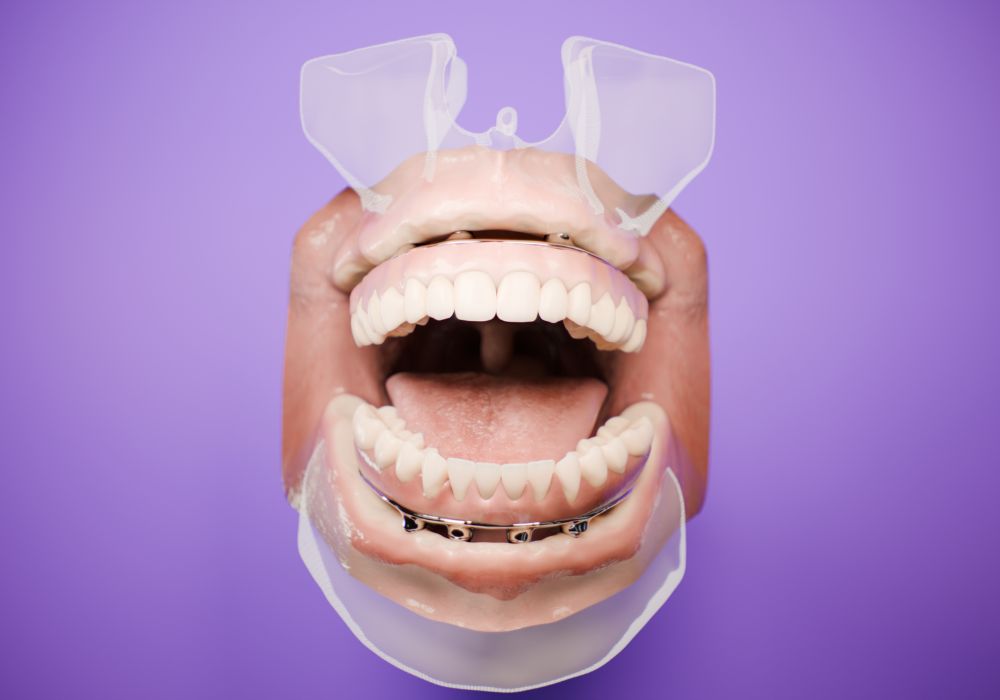Can You Have Dental Implants With Receding Gums?
In this article, we will explore whether individuals with receding gums can still be candidates for dental implants, the challenges they might face, and the potential solutions to ensure successful implant outcomes.


Research different options to find the right pediatrician
Amet mauris lectus a facilisi elementum ornare id sed sed aliquet dolor elementum magnis quisque id ultrices viverra cursus nunc odio in egestas consectetur cras consequat sodales netus pretium feugiat nulla semper senectus bibendum ornare sit adipiscing ut atid viverra donec nunc, donec pulvinar enim ac habitasse fermentum amet praesent atac elementum id sed nibh diam ultrices nibh enim volutpat varius et est sed vestibulum neque.
- Neque sodales ut etiam sit amet nisl purus non tellus orci ac auctor
- Adipiscing elit ut aliquam purus sit amet viverra suspendisse potent
- Mauris commodo quis imperdiet massa tincidunt nunc pulvinar
- Excepteur sint occaecat cupidatat non proident sunt in culpa qui officia
Check credentials and licensing
Lorem ipsum dolor sit amet, consectetur adipiscing elit, sed do eiusmod tempor incididunt ut labore et dolore magna aliqua. Ut enim ad minim veniam, quis nostrud exercitation ullamco laboris nisi ut aliquip ex ea commodo consequat.
Vitae congue eu consequat ac felis placerat vestibulum lectus mauris ultrices cursus sit amet dictum sit amet justo donec enim diam porttitor lacus luctus accumsan tortor posuere praesent tristique magna sit amet purus gravida quis blandit turpis.

Ask friends and family for recommendations
Ornare sit adipiscing ut atid viverra donec nunc, donec pulvinar enim ac habitasse fermentum amet nunc praesent atac elementum id sed nibh diam ultrices nibh enim volutpat varius et est sed vestibulum neque.
Amet mauris lectus a facilisi elementum ornare id sed sed aliquet dolor elementum magnis quisque id ultrices viverra cursus nunc odio in egestas consectetur cras consequat sodales netus pretium feugiat nulla semper senectus bibendum.
“Duis aute irure dolor in reprehenderit in voluptate velit esse cillum dolore eu fugiat nulla pariatur excepteur sint occaecat cupidatat non proident, sunt in culpa qui offi.”
Look for experience in treating your child's age
Duis aute irure dolor in reprehenderit in voluptate velit esse cillum dolore eu fugiat nulla pariatur. Excepteur sint occaecat cupidatat non proident, sunt in culpa qui officia deserunt mollit anim id est laborum.
- Neque sodales ut etiam sit amet nisl purus non tellus orci ac auctor
- Adipiscing elit ut aliquam purus sit amet viverra suspendisse potenti
- Mauris commodo quis imperdiet massa tincidunt nunc pulvinar
- Adipiscing elit ut aliquam purus sit amet viverra suspendisse potenti
Consider location and availability
Duis aute irure dolor in reprehenderit in voluptate velit esse cillum dolore eu fugiat nulla pariatur excepteur sint occaecat cupidatat non proident, sunt in culpa qui officia deserunt mollit anim id est laborum.
Lorem ipsum dolor sit amet, consectetur adipiscing elit, sed do eiusmod tempor incididunt ut labore et dolore magna aliqua. Ut enim ad minim veniam, quis nostrud exercitation ullamco laboris nisi ut aliquip ex ea commodo consequat.
Dental implants have revolutionized modern dentistry, providing a durable and aesthetically pleasing solution for individuals with missing teeth. These implants, typically made of titanium, act as artificial tooth roots that support crowns, bridges, or dentures. They are renowned for their stability, functionality, and ability to preserve jawbone integrity.
On the other hand, receding gums, or gingival recession, is a common dental condition where the gum tissue surrounding the teeth wears away, exposing more of the tooth or its root. This condition can be caused by various factors, including periodontal disease, aggressive brushing, or genetic predisposition. Receding gums can lead to increased tooth sensitivity, a higher risk of decay and infection, and aesthetic concerns.
Understanding the relationship between receding gums and dental implants is crucial for those considering implant surgery.
Receding gums can impact the health of the jawbone and the overall success of dental implants. In this article, we will explore whether individuals with receding gums can still be candidates for dental implants, the challenges they might face, and the potential solutions to ensure successful implant outcomes.
Understanding receding gums
Definition and Causes
Definition: Receding gums, also known as gingival recession, refer to the process where the margin of the gum tissue that surrounds the teeth wears away or pulls back, exposing more of the tooth or the tooth’s root. This condition can lead to gaps or “pockets” between the teeth and gums, which can be a breeding ground for bacteria.
Common Causes
Periodontal Disease: This is one of the most common causes of receding gums. Periodontal disease is a gum infection that destroys the gum tissue and the supporting bone that holds your teeth in place. It is caused by the buildup of plaque and tartar on the teeth and gums.
Aggressive Brushing: Brushing your teeth too hard or using a toothbrush with hard bristles can wear down enamel and push the gums away from the teeth.
Genetic Factors: Some individuals are more susceptible to gum disease and receding gums due to genetic factors, regardless of how well they care for their teeth.
Poor Oral Hygiene: Inadequate brushing, flossing, and rinsing can lead to plaque buildup, which can cause gum recession over time.
Hormonal Changes: Fluctuations in hormone levels, especially in women, can make gums more sensitive and more susceptible to recession.
Tobacco Use: Smoking or using other tobacco products can cause gum recession by affecting the blood flow to the gums.
Teeth Grinding and Clenching: These habits can exert excessive force on the teeth, leading to gum recession.
Misaligned Bite or Crooked Teeth: When teeth do not come together evenly, it can place too much force on the gums and bone, leading to recession.
Symptoms
Tooth Sensitivity: One of the most common symptoms of receding gums is tooth sensitivity. As more of the tooth or its root becomes exposed, it can lead to increased sensitivity to hot, cold, sweet, or spicy foods and drinks.
Visible Tooth Roots: As the gums recede, the roots of the teeth become more visible. This not only affects the appearance of your smile but also makes the teeth more susceptible to decay and damage.
Longer Appearance of Teeth: Teeth may appear longer than usual due to the loss of gum tissue.
Loose Teeth: In advanced cases, receding gums can cause teeth to become loose and unstable, which can lead to tooth loss if not addressed promptly.
Discomfort or Pain: Receding gums can sometimes cause discomfort or pain, especially when eating or brushing.
Understanding the causes and symptoms of receding gums is essential for diagnosing and addressing the condition early. This awareness is also crucial when considering dental implants, as the health of the gums directly impacts the success of implant procedures.

Gum health and bone density
The success of dental implants heavily relies on the health of the gums and the density of the jawbone. Both gum health and bone density are fundamental factors that determine the stability and longevity of dental implants. Understanding the relationship between these two elements is essential for those considering dental implants, especially individuals with receding gums.
Relationship Between Gum Health and Bone Density
Gum Health: Healthy gums provide the necessary support for the teeth and the underlying bone structure. The gums act as a protective barrier against bacteria and other harmful substances that can cause infections and inflammation. When the gums recede, they leave the roots of the teeth exposed, making them more vulnerable to decay, sensitivity, and periodontal disease. This exposure can also lead to a reduction in gum tissue, which is vital for holding the teeth and implants in place.
Bone Density: The jawbone serves as the foundation for dental implants. When a tooth is lost, the jawbone can begin to deteriorate in a process known as resorption. This happens because the bone no longer receives stimulation from chewing, which is necessary to maintain its density and volume. For dental implants to be successful, there must be sufficient bone density to support the implant posts and ensure they integrate properly with the jawbone.
Importance for dental implants
Stability and Integration: For dental implants to function correctly, they must be securely anchored in the jawbone. This requires adequate bone density to hold the implants in place and allow for osseointegration—the process where the bone grows around and fuses with the implant. Healthy gums are also crucial as they provide a seal around the implants, protecting the underlying bone from infection and supporting the overall structure.
Risk of Complications: Compromised gum health and insufficient bone density can lead to several complications with dental implants. Poor gum health can result in peri-implantitis, an infection that affects the gums and bone around the implant, leading to inflammation, bone loss, and potential implant failure. Similarly, low bone density can prevent the implant from integrating properly, resulting in instability and increased risk of implant failure.
Maintaining optimal gum health and bone density is crucial for the success of dental implants. Regular dental check-ups, proper oral hygiene, and addressing any issues related to gum recession or bone loss promptly can significantly improve the outcomes of dental implant procedures. For individuals with receding gums, consulting with a dental professional is essential to evaluate their specific situation and determine the best course of action to ensure the long-term success of their dental implants.
Treatment options for receding gums
Addressing receding gums is crucial for ensuring the success of dental implants. Various treatment options are available to improve gum health and prepare the mouth for implants. These include gum grafting, scaling and root planing, and maintaining regular dental care.
Gum Grafting
What is Gum Grafting? Gum grafting is a surgical procedure used to repair receding gums. It involves taking tissue from another part of the mouth, often the palate, and attaching it to the area where the gums have receded. This new tissue helps cover the exposed roots of the teeth and enhances the gum line.
How Does It Improve Implant Success? By increasing the amount of healthy gum tissue around the teeth, gum grafting provides a stronger, more stable environment for dental implants. This added tissue helps protect the underlying bone and reduces the risk of peri-implantitis.
Enhances Aesthetics: Gum grafting can improve the appearance of the gums, making the overall smile look more natural and healthy. This is particularly important for implants in visible areas of the mouth.
Reduces Sensitivity: Covering exposed roots can significantly reduce tooth sensitivity, making it more comfortable for patients to eat and drink.
Scaling and Root Planing
What is Scaling and Root Planing? Scaling and root planing, also known as deep cleaning, is a non-surgical procedure used to treat periodontal disease and remove plaque and tartar from below the gum line. The process involves two main steps:
Scaling: This step removes plaque and tartar from the tooth surfaces and beneath the gums.
Root Planing: This step smooths the root surfaces, making it harder for bacteria to adhere and allowing the gums to reattach to the teeth.
Role in Treating Gum Disease
By removing the bacterial buildup that causes inflammation, scaling and root planing help reduce gum swelling and bleeding.
Smoothing the root surfaces and eliminating tartar allows the gums to heal and reattach to the teeth more effectively, which is crucial for creating a healthy foundation for dental implants.
Regular deep cleaning can prevent the progression of periodontal disease, preserving both gum and bone health.

Regular dental care
Importance of Maintaining Good Oral Hygiene: Regular brushing and flossing are essential for removing plaque and preventing gum disease. Using a soft-bristled toothbrush and gentle techniques can help avoid further gum recession. Using an antibacterial mouthwash can reduce bacteria in the mouth and help maintain gum health.
Regular Dental Visits: Regular visits to the dentist for professional cleanings are crucial. These cleanings remove plaque and tartar that cannot be eliminated by brushing and flossing alone.
Regular check-ups allow for early detection and treatment of gum disease and other oral health issues. This proactive approach can prevent minor problems from becoming major concerns that could jeopardize the success of dental implants. For patients with receding gums, regular dental visits allow for continuous monitoring of gum health and the effectiveness of any treatments received.
By addressing receding gums through treatments like gum grafting and scaling and root planing, and maintaining regular dental care, patients can significantly improve their oral health. These measures create a stable and healthy environment that enhances the chances of successful dental implant integration and long-term oral health.
In summary, the feasibility of dental implants for individuals with receding gums depends on several critical factors including the extent of gum recession, overall gum health, and jawbone density. Dental implants are a viable option for those with receding gums, provided that the underlying causes of the recession are addressed and adequate preparations are made to ensure the health and stability of the gums and bone.
It is essential for individuals with receding gums considering dental implants to consult with a dental professional. A thorough evaluation and personalised treatment plan can address specific concerns and ensure that the gums and bone are in optimal condition for implant surgery. By taking these proactive steps, patients can achieve a stable, functional, and aesthetically pleasing smile through dental implants, even with a history of receding gums.
We invite you to schedule a consultation with our experienced 21D dental team to discuss your specific situation. During this consultation, we will thoroughly assess your gum health and bone density, discuss any concerns you may have, and outline the most effective treatment options available to prepare your mouth for dental implants. Our goal is to help you achieve a healthy, stable foundation for your implants, ensuring their long-term success and enhancing your overall oral health.

Exploring your options or wanting to find out what we are up to? We are active on social media and regularly post educational videos as well as resources.
Not ready yet?
That’s okay, you’re not alone...
Join our Facebook Patient Group, a safe and supportive space where you can connect with others who share your questions and concerns, and hear from people who’ve already been through the journey themselves.
Who better to talk to than those who truly understand?
Book your free clinical assessment.
Start your journey to a new smile. During the assessment, you will have the opportunity to meet with one of our skilled clinicians and discuss your treatment options in detail. The assessment is free of charge, and there is no obligation to proceed with treatment. Reach out to us to take the first step towards the future you.
Not ready yet?
That’s okay, you’re not alone...
Join our Facebook Patient Group, a safe and supportive space where you can connect with others who share your questions and concerns, and hear from people who’ve already been through the journey themselves.
Who better to talk to than those who truly understand?

.png)



